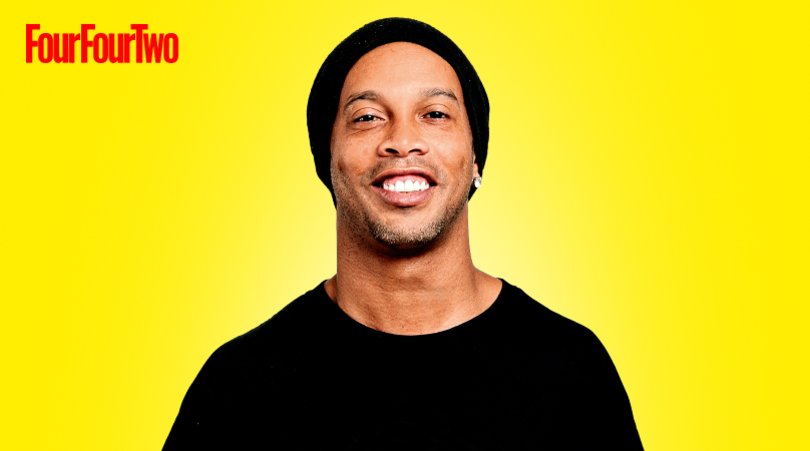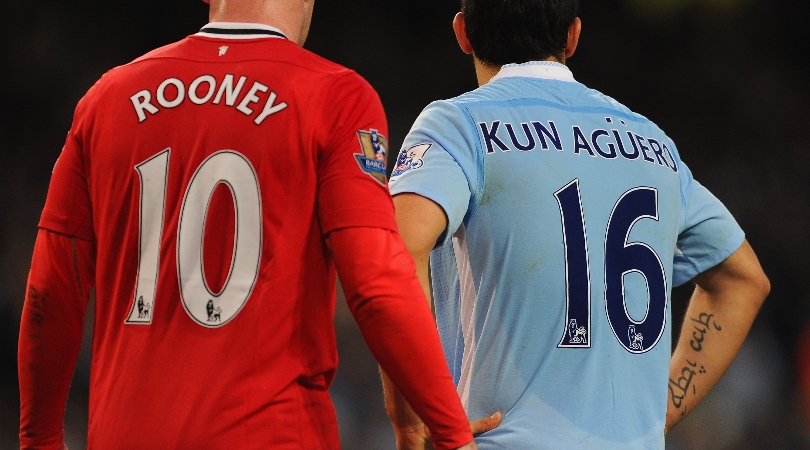Long read: Being Paul Pogba – life as football's most scrutinised superstar
He’s a superstar meme whose every touch, tweet or trim is subject to criticism. If that wasn’t enough pressure, Paul Pogba is expected to spearhead a resurgence at Manchester United: bring back trophies on the pitch, be the global face of the brand off it. Can he do it? Time to find out...
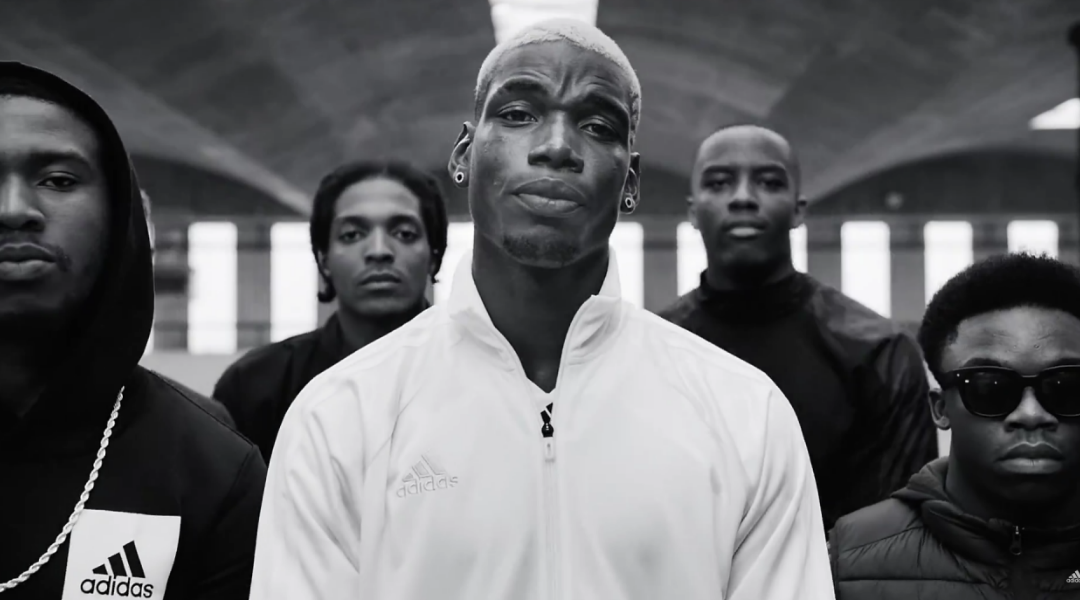
The room falls silent as the television cameras zoom in on the young superstar. The interviewer gets things underway. “Well, Paul, a 2-0 victory – what’s your response to that?”
The youngster shifts uneasily from one foot to the other, his eyes nervously darting around the room, trying to avoid any eye contact. “Well, there’s nothing you can say about it,” comes the mumbled reply. “It was magnificent… erm.”
His prolonged pause is met by stifled giggles from team-mates, who are gathered just out of shot. Clearly embarrassed, he fixes his gaze on his interviewer for the first time and takes a breath. “It was great to go down 2-1 in the first leg, and then come to Millwall and win 2-0,” he replies, semi-confidently.
The two-legged clash in question was a FA Youth Cup semi-final. And the young prospect? Paul Scholes.
In the spotlight
The fact the aforementioned chat took place on a media training course that has since found its way onto YouTube, rather than on national television, perhaps tells its own story. In the 20 years that followed that 1993 fixture, Scholes played 718 games for United, winning 11 Premier League titles and two Champions Leagues – but never quite seemed comfortable under the media spotlight.
Playing for Manchester United’s all-conquering side of the 1990s came with an unprecedented degree of attention from sponsors and the media. Fortunately for Scholes, David Beckham – a cultural icon as much as a football one – was on hand to draw much of the focus. Scholes was free to do his thing on the pitch, while Beckham – also a fine footballer, of course – helped to develop his own global ‘brand’ and that of his football club.
Get FourFourTwo Newsletter
The best features, fun and footballing quizzes, straight to your inbox every week.
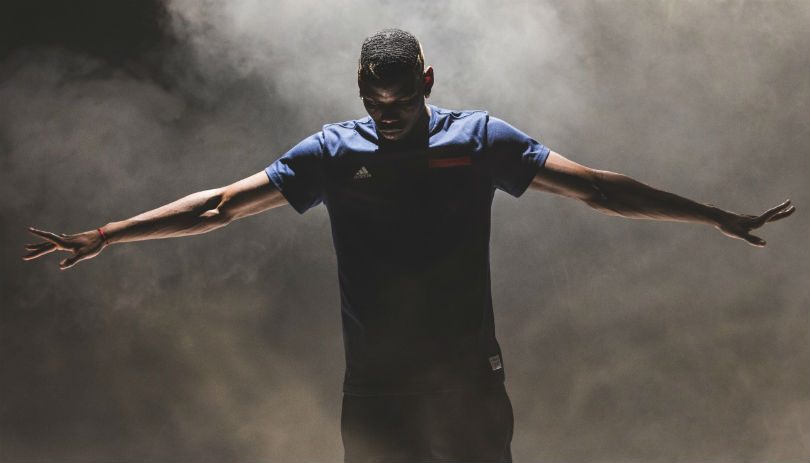
On the pitch, both players were self-assured and headstrong, attributes that were honed under the guidance of talismanic Frenchman Eric Cantona; the key figure in the United side they broke into during the first half of the ’90s – the man who dragged the club back to the top.
Scholes the match-winning midfielder, Beckham the commercial entity and Cantona the charismatic leader; all three of them played very different, but very important roles in sealing Manchester United’s status as the biggest football club in the world.
Now just one man is being asked to combine all three of those roles for the Red Devils. And it’s no easy task.
At school with Scholes
Jonny Evans still vividly remembers Paul Pogba’s promotion to train with the Manchester United first team in 2011.
I was amazed someone of his age looked so at ease with players of the quality of Giggs and Scholes
“I was amazed someone of his age looked so at ease with players of the quality of Giggs and Scholes,” the ex-United defender tells FFT. “He had power, skill and complete control of the football. His skill and technique for such a big player meant he could manipulate the ball, yet he was also so strong he could hold people off. Scholes would kick him every day to try to get the ball off him.”
Pogba may have only been 17, but Manchester United’s senior players already knew all about this French prodigy. He was a star of the club’s youth team, at the time on a run towards lifting the 2011 FA Youth Cup. He’d been promoted above his age group, and Evans’s younger brother Corry had been in the same reserve side.
“I used to kick him a lot,” Corry, now at Blackburn, admits. “Paul was technically excellent and I tried to toughen him up. He could handle it.”
The pair’s former coach, Paul McGuinness, could instantly tell that the young Pogba had the respect of his peers.
“Paul was a very popular lad,” McGuinness says. “He was just like a Pied Piper with the younger lads, who really looked up to him. His background as a street footballer was clear. He’d played in cages in France, which hone your skill. We let him develop at United by letting him play freely, like he was in a playground.
“Rather than having a coach barking orders, it relaxed the players who weren’t afraid of making mistakes, so Paul carried on practising that flick he does over the head of a rival.”
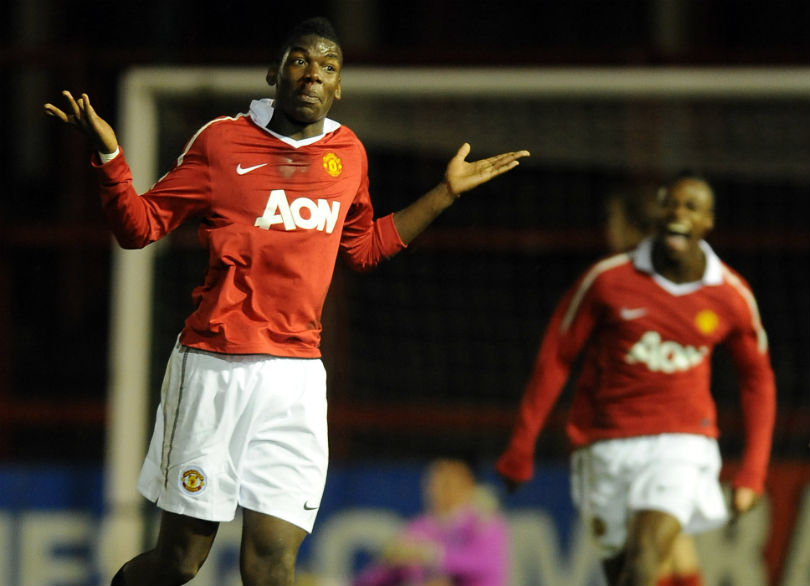
Fergie’s frustrations
At every level Pogba’s promise was clear, but United had a recent history of young prodigies failing to make the expected impact in the first team and leaving in search of regular football – Gerard Pique and Giuseppe Rossi among them. Both players departed for Spain with the reluctant acceptance of Alex Ferguson, who knew they both deserved to play first-team football.
He was just like a Pied Piper with the younger lads, who really looked up to him. His background as a street footballer was clear
Ferguson tried very hard to keep hold of the lad who had arrived in controversial circumstances from Le Havre in 2009. He offered Pogba the best-ever contract for a reserve player, around £20,000 a week. It was declined. United’s players encouraged him to stay. Club legend Paddy Crerand even visited Pogba at his home.
“I told him he would be mad to leave,” says Crerand. “Paul was a nice kid, but from what I saw, the decision had already been made for him to sign for Juventus. I told him he was crazy, that United was the best place for him.”
Relations between Ferguson and Pogba’s representative Mino Raiola soured. The pair were like oil and water, but Raiola felt justified. If his client was so highly rated, why wasn’t he picked to play against bottom-of-the-table Blackburn at Old Trafford on December 31, 2011, despite there being a midfield injury crisis? Ferguson preferred to start right-back Rafael and wideman Park Ji-sung in central midfield. Blackburn won 3-2. A draw, it turned out five months later, would have been enough to give United the title.
“It was a very, very difficult moment for me because I was in love with Manchester and I was a Mancunian,” Pogba later said of his United departure.
“I wasn’t involved in the deal,” United’s chief executive Ed Woodward later explained, “but from what I’ve heard a situation was cooked up and I’m not sure that we could have done anything different to how we played our cards. It was a stacked deck.”
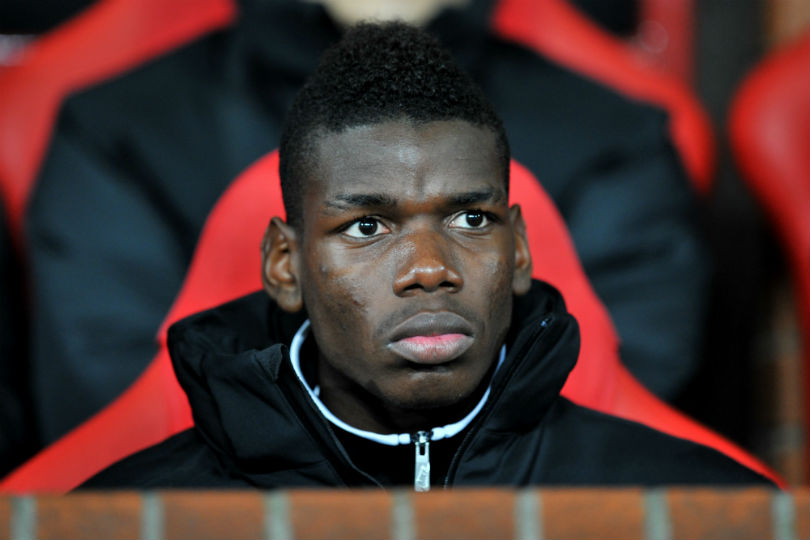
Pogba’s contract ran down and in 2012 he joined Juventus on a free transfer, enjoying four exceptional campaigns, winning four successive Serie A crowns as well as reaching the 2015 Champions League Final.
Manchester United’s achievements in the same period didn’t come close, and by the time David Moyes took over at Old Trafford in 2013, the club realised that they wanted Pogba back. It would take more than three years for that to be achieved.
Getting their way
Jose Mourinho was vexed as he faced the media in a windowless room in the Shanghai Stadium, where Manchester United were due to play Borussia Dortmund in a July 2016 friendly.
Mourinho put on a positive show for the cameras, but behind the scenes United’s pre-season tour was agitating him
The Portuguese boss put on a positive show for the cameras, but behind the scenes United’s pre-season tour was agitating him. The playing surface for a planned Manchester derby in Beijing was unplayable after floods, the summer heat unbearable and the commercial demands from club sponsors uncompromising.
Half of Mourinho’s squad flying in on a separate plane were delayed by a storm. And all this in the knowledge that he had to hit the ground running, as well as re-coach his players after two seasons of being told to play the Louis van Gaal way.
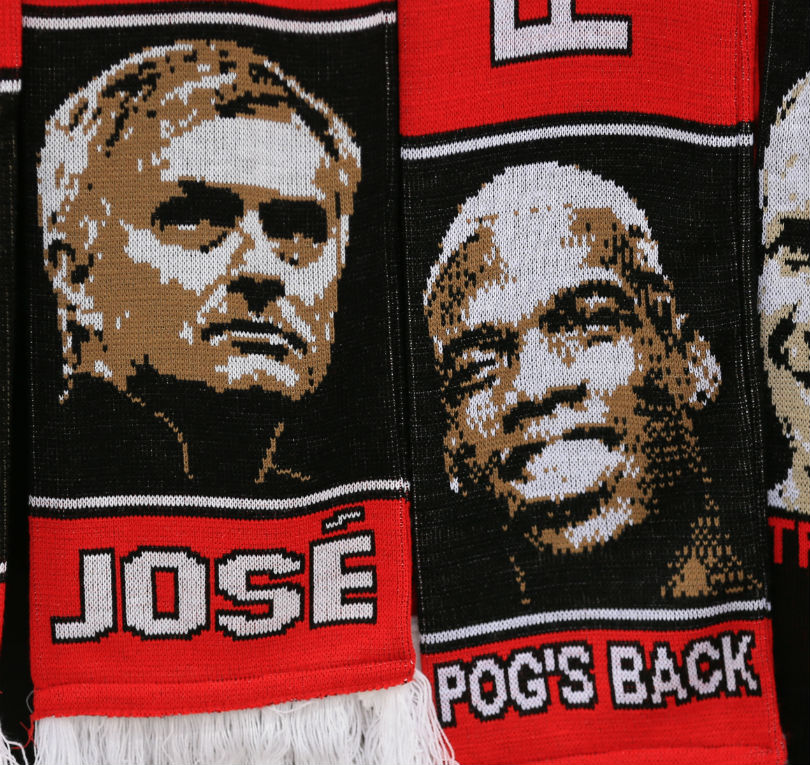
But Jose was also getting what he wanted from his new employers.
“I asked for four profiles of players,” Mourinho told the assembled media. I gave them a few options and they did for me 75 per cent in [Zlatan] Ibrahimovic, [Henrikh] Mkhitaryan and [Eric] Bailly. We have just 25 per cent to do before August 13.”
The 25 per cent was Pogba, but first they needed to wrap up dealings with Pogba’s ‘Mr 10 per cent’, Raiola. Despite sterling sliding after Brexit, Mourinho knew that talks to sign Pogba for a world record transfer fee from Juventus were at an advanced stage. He also knew that Woodward was working on the deal so much that he’d delayed his arrival in China, cancelling a press briefing with British journalists in Beijing that meant he ended up flying to China for one night.
Woodward was shattered and tripped in the lobby of United’s hotel
Woodward was shattered and tripped in the lobby of United’s hotel, as the players rested after their derby date with City was postponed. “Penalty!” shouted the watching Crerand, a smirk on his face.
Inside the Juventus dressing room, there was surprise. The players, who had been part of a far more trophy-laden team than Manchester United, believed Pogba was staying put in Turin in an attempt to win the Champions League in 2016/17.
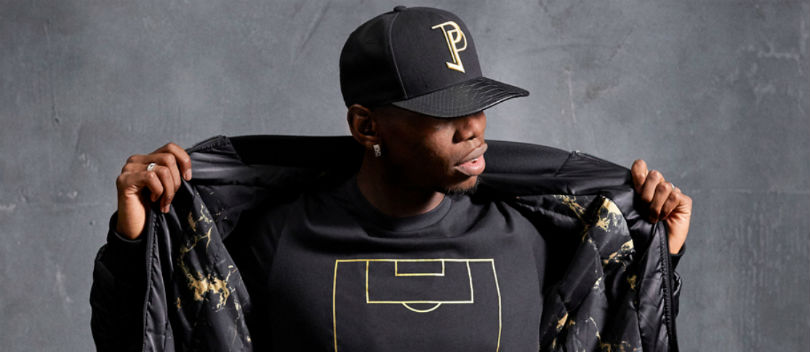
But others at the club were more circumspect. They knew Barcelona, Real Madrid and both of the Manchester clubs had displayed serious interest in the past 12 months, and senior officials felt he was set to choose Real. United felt the same thing. Pogba went to friend and Juve team-mate, Patrice Evra.
“I told him that if he was going to leave then he should join United,” the left-back tells FFT. “Juve is a great club and I would have been happy if he’d stayed with us, but I said that Manchester United is a massive opportunity for him. Paul is like a brother to me and I want the best for him. I will kill people who want to take advantage of him or try to do something bad. Paul’s got a really good heart.”
Act of persuasion
United were wary of Real’s interest, but felt they had their own trump cards – and not only more money from burgeoning revenue streams.
I will kill people who want to take advantage of Paul or try to do something bad. He's got a really good heart
Players often have bigger social media followings than the clubs they play for, and Pogba’s grew by 25 per cent after he was strongly linked with a move back to Old Trafford. The Premier League club used this as a negotiating tool. They knew Madrid, the reigning European champions, had a stronger team than their own – one that wasn’t even playing in the Champions League – but they turned that negative on its head.
Some finish from ! August 18, 2017
United stressed to Pogba that if he went to Madrid then he would be the third- or fourth-ranked player behind Cristiano Ronaldo and Gareth Bale. Neither would be surpassed by a midfielder. United pitched that if Pogba returned to where he still had a lot of friends, they’d make him the main man.
Under their new boss, the team would be built around Pogba and his profile would explode – something he’d already seen evidence of in his own social media following.
United pitched that if Pogba returned to where he still had a lot of friends, they’d make him the main man
Madrid weren’t quite as desperate to sign Pogba as their rivals. After all, the immediate aftermath of a Champions League win is one of the few times their famously demanding fanbase is sated – albeit briefly. Barcelona’s interest had long since diminished once they realised how much cash Juventus wanted for their star man.
The road was clear for United, who busily worked up slogans and memes ahead of a huge transfer splash. The word ‘Reunited’ was a logical theme, while #Pogback was the hashtag of choice. In real life, meanwhile, Pogba arrived at Carrington in a flashy red car from club sponsors Chevrolet. South London grime artist and Manchester United supporter Stormzy also penned a track in collaboration with the club, the player and adidas.
A penny for the thoughts of Ferguson, who would have signings picked up at the back gate of Manchester Airport by anonymous members of staff in the hope that they wouldn’t get recognised.
Manchester social
Back in November 2016, Manchester United’s Group Managing Director Richard Arnold gathered his notes and took to the stage at Lisbon’s Web Summit, a conference attended by 70,000 people. Arnold, Ed Woodward’s sidekick and the man behind many United sponsorship deals, values his privacy and does very little media, despite being a key decision-maker.
The seating was full for Arnold’s 20-minute slot, and he made a point of talking up the importance of social media to England’s biggest football club. Behind him, a screen buzzed with United’s key statistics: 71 million ‘likes’ on Facebook, 11 million followers on Twitter. Another 11 platforms popular in various corners of the globe were also highlighted.
United had initially been slow to embrace social media because the Glazers feared a barrage of criticism following their takeover in 2005, but they are now fully engaged and can boast of the success of campaigns such as #Pogback.
Over a giant photo of Pogba’s face, a series of graphics appeared on a screen behind Arnold. Under the heading ‘#Pogback: Record Breaking’ and ‘Revolutionary Transfer Social Media Campaign’, the United director explained how Pogba’s deal resulted in the most retweeted United post of all time, and the most read article ever to appear on United’s websites.
A graphic illustrated how #Pogback had 635,000 interactions on Instagram – “a greater number than any of United’s rival clubs’ most-popular signing”. Arnold said nothing, but a graph behind him did the talking: Luis Suarez’s move to Barcelona had 219,000, Gonzalo Higuain to Juve 145k, Bale to Madrid 112k, Cesc Fabregas to Chelsea 96k and Kevin De Bruyne to Manchester City just 56k.
The level of engagement and fervour we are getting is on a par with the world’s major religions
“Engagement isn’t a part of what we do – it’s everything we do,” said Arnold, who then unleashed a barrage of graphics to show that United are the world’s most ‘engaged’ sports club, with retweets as the indicator. Arsenal are second, Liverpool third and Chelsea fourth, with the Golden State Warriors’ basketball team fifth. Madrid and Barça are 6th and 7th, with City 9th.
“John Lennon was famously quoted as saying that The Beatles were ‘bigger than Jesus’,” Arnold continued. “While we wouldn’t want to be disrespectful in that way, what you are seeing from a measurement point of view is that the level of engagement and fervour we are getting is on a par with the world’s major religions, and those are the only things at the same level as United in terms of that interaction and engagement.”
And United want more of it. Arnold outlined United’s social media strategy to ‘drive engagement’ with Pogba right at the heart of it all.
What appeared next on the screen was a string of buzzwords that probably mean little to the uninitiated: “Meet fans where they are – multi-platform; entertain – storytelling; communicate – creating conversations; give reasons to return – exclusivity and shareability; localise – speak the language of fans; digestible – device centric; data – measure, analyse & optimise.”
Records reap rewards
That last word is key. For years, United struggled to monetise their vast popularity. In the past, fans in Asia mostly bought counterfeit shirts and didn’t buy match tickets. It was only when the club hit on a strategy – since copied by all of their rivals – of finding partner sponsors around the world to align their brands to one of football’s most popular football teams, that commercial success snowballed.
And to be the most popular, you need to be talked about. OK, one way is winning trophies, but another is breaking transfer records.
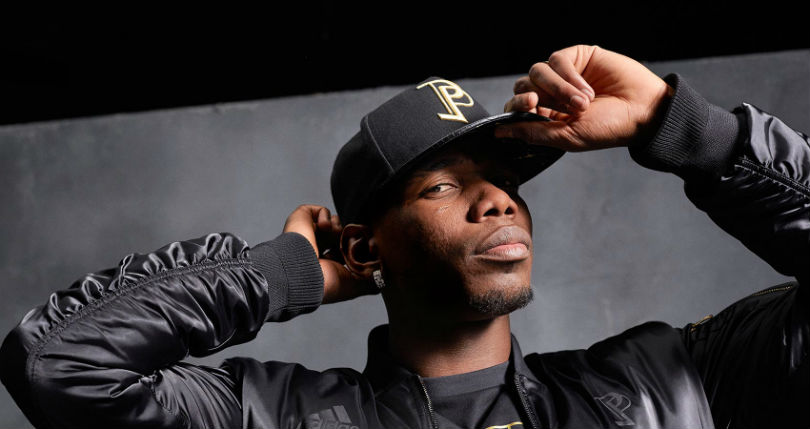
The crowd of techies in Lisbon applauded loudly, although the British media, few of whom had been present in Portugal, took a more cynical view and went for the clickbait-like ‘United claim they’re bigger than Jesus’ headlines.
Richard Arnold didn’t mind one bit – excellent publicity and, in Paul Pogba, he felt that United had the perfect social media partner.
“Paul is an eccentric,” says Evra. “Every day he wants to create something new. He’s a creator, not only in football but in his life, and you see that on social media.”
If he has a bad game, people criticise him for what he does on social media or his haircuts, but he won’t change. He thinks for himself and he acts for himself
But the 35-year-old defender, now playing for Marseille after leaving Juventus in January, also stresses that there’s much more to Pogba than what pops up on your smartphone.
“If he has a bad game, people criticise him for what he does on social media or his haircuts, but he won’t change. He thinks for himself and he acts for himself.
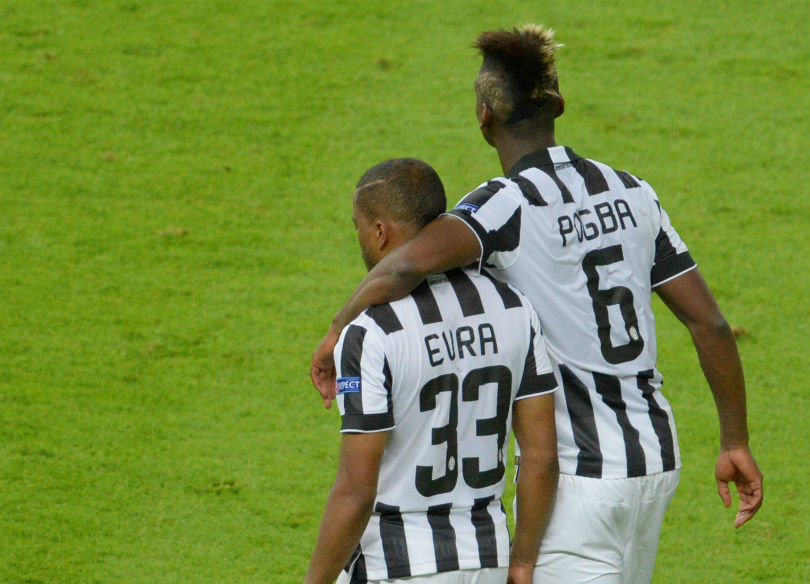
“I don’t want his image coming before his football, and although I’m not worried that will happen, I’m scared other people hope it does so they can criticise him like they did with David Beckham.”
Manchester United were the sixth-best team in England for most of 2016/17. They weren’t even playing in the Champions League, but their profile continued to soar – partly thanks to Pogba.
The £90m problem
The Pogba brand reached new heights when images of a Paul Pogba emoji started flashing around the Old Trafford electronic advertising hoardings during a Premier League encounter with Liverpool on January 15, 2017. Pogba had his initials shaved into his hair and dyed gold to mark the occasion. At the centre of the attention, he had one of his most disappointing games since his return as United drew 1-1 with their out-of-form rivals, clumsily conceding a penalty for a first-half handball.
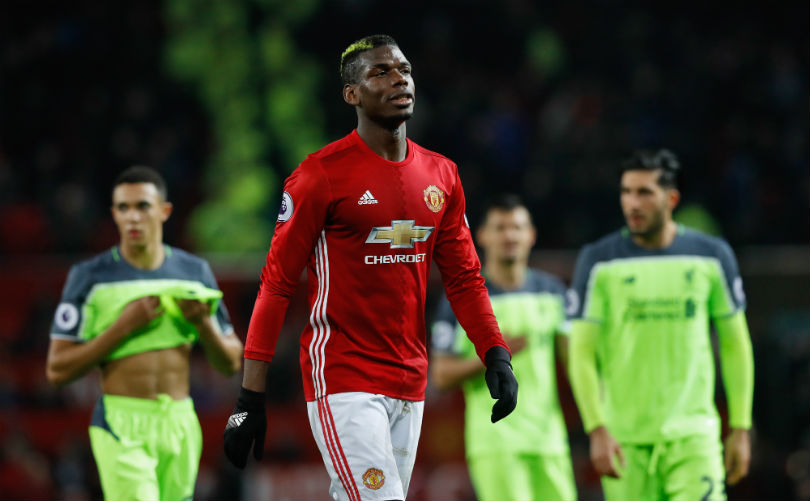
What the Frenchman does on a football field should be what matters most, of course, and last season he was less than spectacular. Criticism started to build slowly throughout the second half of last season, albeit with plentiful caveats from pundits who don’t want to look stupid should he become the best midfielder in the world three years down the line.
This season Pogba is looking much more like the player United wanted – needed even – when they snared him last summer. The Frenchman has been one of the division’s best players of 2017/18, thanks in part to the arrival of Nemanja Matic from Chelsea.
Criticism started to build slowly throughout the second half of last season, albeit with plentiful caveats from pundits who don’t want to look stupid
Last season, Mourinho largely used Pogba as a deep-lying midfielder in a 4-2-3-1 line-up – a role to which he is ill-suited, at least according to his critics, including Jamie Carragher and Frank Lampard.
“He is nowhere near good enough or disciplined enough to be able to play in that central midfield position,” Sky Sports pundit Carragher said in March. “He’s a liability defensively. They should have lost the League Cup final [to Southampton]. Up against one of the top sides I think they would’ve lost – Pogba was one of the reasons why.”
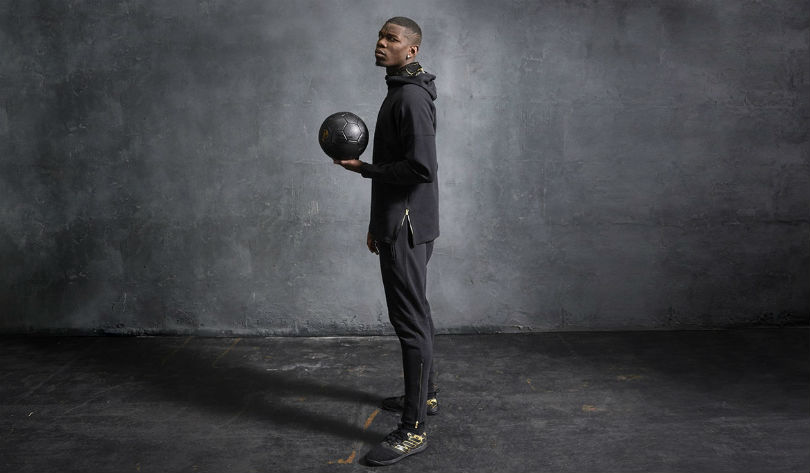
Lampard agreed with him. “His responsibility there has to be more defensively-minded. When Mourinho plays a two in midfield, then he wants them to defend. He wants their first thought to be about security. I feel harsh criticising him because I don’t think it’s his real attribute to do that. I feel that Jose would want a holding midfielder doing that.”
The ex-Chelsea and England midfielder then let fly with a damning one-liner.
“If you spend £90m, you don’t want a £90m problem. I’m sure Jose Mourinho will solve it but at the moment he’s just not fluent.”
He is nowhere near good enough or disciplined enough to be able to play in that central midfield position. He’s a liability defensively
Yet Manchester United players see it slightly differently.
“I play deep in a three-man midfield, or even if I play as a two, whoever tends to be with me tends to be the one that goes forward a little bit more, be it Paul [Pogba], Ander [Herrera] or [Marouane] Fellaini,” explains Michael Carrick.
Lampard was one of the finest central midfielders of his generation, but by 23 he had scored 39 goals to Pogba’s 51, picked up two international caps to Pogba’s 42 and won no trophies to Pogba’s seven. Lampard’s transfer fee upon moving from West Ham United to Chelsea (£11m) in 2002 was also considered to be excessive at the time.
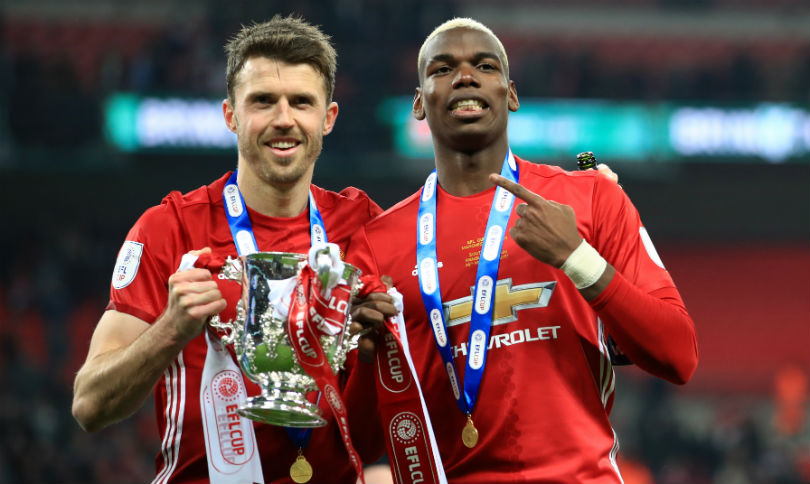
Clearly, Pogba is expected to get better with age. Nobody can deny, however, that he performed poorly in United’s two biggest home games of the league season, with an ill-disciplined performance in September’s Manchester derby defeat at Old Trafford prior to the no-show against Liverpool.
But his team-mates are on message. At Carrington, United’s training ground, Carrick is insistent: “Paul can control a match,” he says. “His passing is very accurate, even over long distances. He can slow the game to give his side control and he always has a strong influence over a game. Only the best can do that.”
Icon for a generation
United fans hoist a ‘Young, gifted and back’ graphic of Pogba’s head before every home game, although he is yet to become the subject of a terrace song that has truly caught on quite like Zlatan’s.
Among the 8-16 age group, shirts bearing Pogba’s name are the number one in United’s club megastore. Youngsters love his dancing, his tricks, bling and attitude.
“If social media is Paul’s vice then that’s not a problem,” says Jonny Evans, now on the books of West Brom after leaving United in 2015. “There are much worse things that other lads are going to do. The main thing is that he plays well on the pitch and there are times when he does and times when he doesn’t – but he’s still very young.”
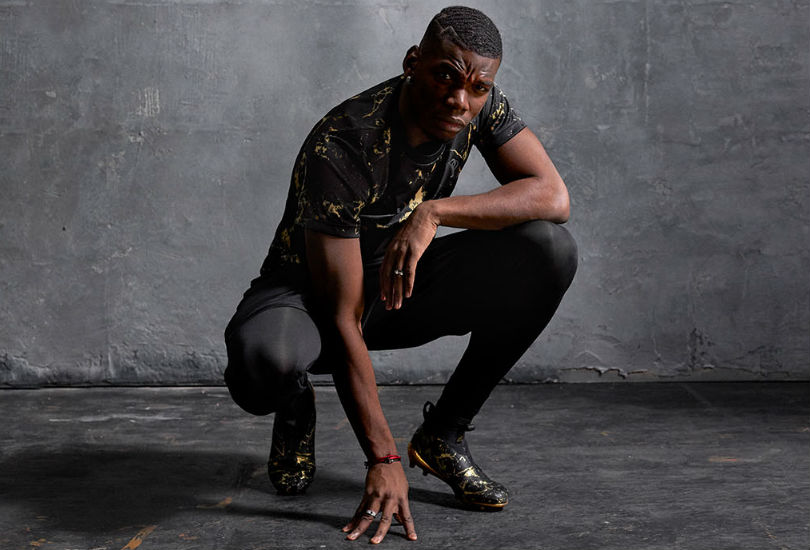
Evra agrees with his fellow defender.
“People will criticise Paul,” he says. “They will see him put a video on Instagram and say, ‘why are you doing this? You should be practising.’ But it takes one minute to put the video up and I think he likes the rush of blood that comes with that. He puts pressure on himself, but he can handle it. He’s comfortable with sponsors, too. He must make sure they don’t interfere too much with his career.
Among the 8-16 age group, shirts bearing Pogba’s name are the number one in United’s club megastore
“I don’t think that the young version of me would have been able to deal with all of the social media and play football as well, but Paul does it really well. He’s showing his maturity.”
Social media is one area where the maturing Pogba felt wise enough to offer some advice to veteran full-back Evra, who he calls ‘Uncle Pat’. Evra is now one of the most – if not the most – entertaining footballers on the platform.
“Paul was actually the one to push me to join Instagram,” explains Evra. “I’d seen Rio [Ferdinand] with his Twitter account and the other players talking about the huge numbers of people that were following them, but it all baffled me. I had thought it was all rubbish. But then Paul told me about Instagram and I started with one or two pictures. And then I was really starting to enjoy it.”
Personality counts
A strong personality is key to succeeding at the highest level in any walk of life, and Michael Carrick believes Pogba has the kind that can be an asset in the dressing room of a football club that is striving to be the very best on the planet once again.
“Like Ibrahimovic, Paul is confident. He has a belief in himself which then rubs off on the less experienced players. We’ve not had that type of character inside the dressing room for quite some time. It’s not something that anyone else could be as you have to be yourself. I couldn’t turn into something that I’m not.
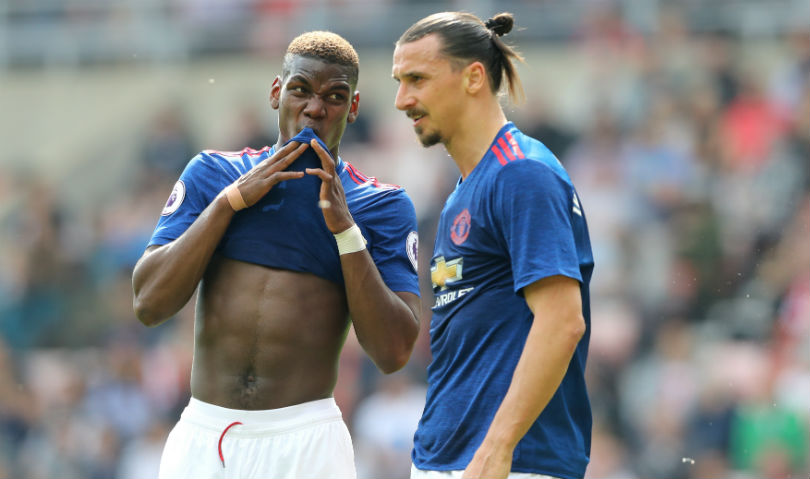
“People might see the lad who’s changing his hairstyle all of the time, but I look at him as a footballer. And I see a player who comes in each day and trains really hard – a lad who just loves playing football. You can see players in the past who have gone down that route and been caught out by everything around them. Their football suffers.
“But I can see that football is the main thing for Paul and it has to be. Everything else is on the side. He’s grown through the season as it’s gone on and I’m sure he’s going to get better and better.”
I don’t think that the young version of me would have been able to deal with all of the social media and play football as well
When asked by fanzine United We Stand whether, as a man of 35, he ever looked at his fellow professionals listening to Stormzy and doing dab videos for Instagram and Twitter and thought to himself, ‘I’m too old for this s**t?’ Carrick’s response was simple.
“Times have changed and I’m a little too old for [those sorts of things], but I was probably doing things at 22 that older players cringed at a bit. The world moves on and you have to deal with it.”
Pogba – not to mention Mourinho - will be judged more harshly in their second seasons. Roy Keane, who is not a fan of selfies and the culture espoused by Pogba and his peers, was also a British record transfer fee when he arrived at Old Trafford as a midfielder in 1993. He was an immediate success, but then he’d just joined the league champions and not a team and a club that was undergoing massive transformation after more than a quarter of a century of Fergie rule.
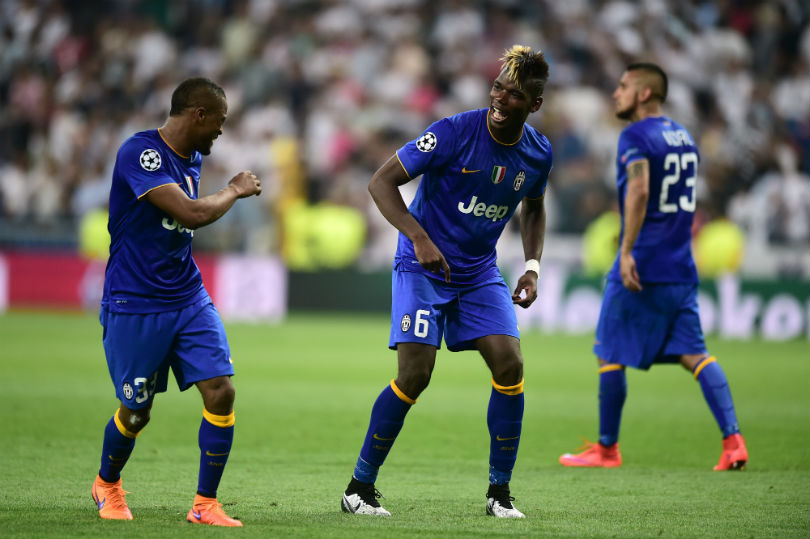
“The big price on his head is hard and I’ve told him this,” adds Evra, who was asked not to speak about Pogba when he was at Juventus because fans thought he had pushed the midfielder towards United.
“People expect miracles because he cost so much. They criticise him if he doesn’t score any amazing goals, but Paul is not a goalscorer who scores 30 a season.”
Productivity in progress
His goalscoring and assists have been consistent. Since becoming a full first-teamer at Juventus, Pogba chipped in with nine goals and 16 assists in 2013/14, 10 goals and 11 assists in 2014/15 and 10 goals and 13 assists in 2015/16. He managed fewer in 2016/17: nine goals and six assists – although one of those was the opener in United's Europa League final win over Ajax.
He already has two goals in the first four Premier League games on 2017/18 – almost three, were it not for a deflection off team-mate Marcus Rashford’s head against Stoke. Most pleasingly for United fans, the 24-year-old Frenchman’s all-round performances have been exceptional in their team’s ascent to the Premier League summit.
“I sometimes worry for him because he’s still so young and too much pressure can restrict your game,” Evra says. “Paul has got to be free, to enjoy, to smile. That’s when he’s at his best. To control a team and be a leader takes experience, but he is very mature for his age.
People might see the lad who’s changing his hairstyle all of the time, but I look at him as a footballer. And I see a player who comes in each day and trains really hard
“He talks with the younger players and respects the older players. He wants to learn and he’s good in the dressing room, where he’s serious and yet brings lots of laughs. Paul is a happy guy – we should be thankful we are being paid to play football every day, no?”
Evra agrees that Pogba is a work in progress.
“Paul is working at being more consistent, to become a machine who wants to win everything. Everyone can have a great game and score a great goal. The great players have lots of great games – they have a consistency like Andres Iniesta or Frank Lampard. I think Paul can be in this class too, but he’s different from them.
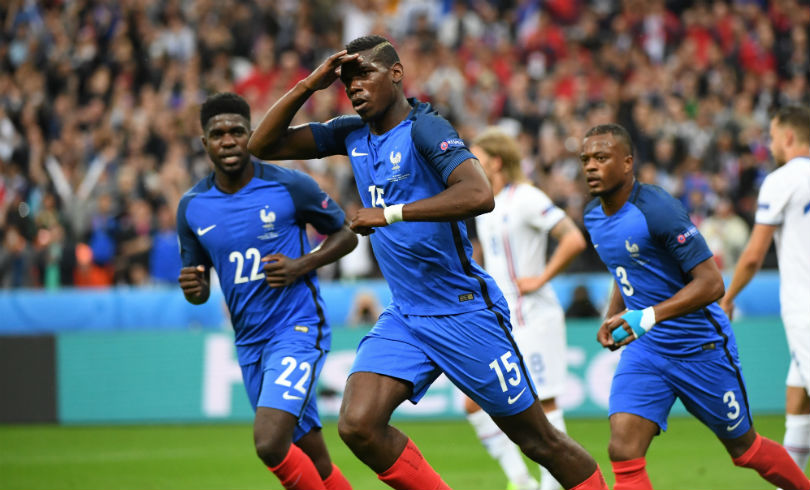
“Paul will win you matches because he can create. I don’t want to add pressure by saying that he’s going to be the best player in the world, but he has got everything to become the best midfielder.”
Evans concurs: “He’s a superstar and he’s going to get better and better. Some of his positional play can sometimes be a bit gung-ho, but he’s got so much more than other players can offer. His technique means that he can manipulate the ball, his touch is excellent, and then you have his pace and power. What else does he need other than using his brain at the right time and picking the right passes?”
Three jobs in one
Well, a few more goals certainly wouldn’t do any harm, nor would a little more tactical flexibility. After all, if you spend £90m on a player, you want him to be capable of excelling in more than one role and in more than one system. Above all else, Manchester United need a player who can dominate and run the midfield in a big game – something Pogba’s struggled to do since his big-money move back to Old Trafford.
However, if making the step up to the required level on the pitch sounds like a tough ask, remember that it’s just one third of the job ahead. He must also become a leader of a dressing room that has already said goodbye to some of its more senior figures like Wayne Rooney, while acting as the public persona of a global superbrand.
Those are three pretty big plates to keep spinning, and there’ll be millions of people waiting to shoot him down should he fail to do so. Whereas this burden was once shared by a trio of Manchester United legends, it now rests on the shoulders of the 24-year-old Frenchman.
Bonne chance, Paul.
This feature originally appeared in the May 2017 issue of FourFourTwo. Subscribe!

Andy Mitten is Editor at Large of FourFourTwo, interviewing the likes of Lionel Messi, Eric Cantona, Sir Alex Ferguson and Diego Maradona for the magazine. He also founded and is editor of United We Stand, the Manchester United fanzine, and contributes to a number of publications, including GQ, the BBC and The Athletic.

